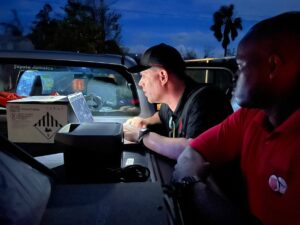New initiative adds addiction education to day camp programming in San Francisco’s Tenderloin.
This summer, the San Francisco Kroc Center partnered with the Addiction Education Society (AES) to provide kids with the skills needed to understand and prevent addiction.
Over the course of two days, 22 campers ages 11-13 delved into topics such as addiction risk factors, brain chemistry and warning signs.
By implementing new programs, Kroc Center Corps Officer Captain Arwyn Rodriguera said she hopes to “break the generational cycles of what happened in this neighborhood one kid at a time.”
For families living in the Tenderloin, addiction is a prevalent issue.
“When you walk the Tenderloin, you literally walk over the bodies of people using,” she said.
In July alone, the San Francisco Office of the Chief Medical Examiner reported 39 accidental overdose deaths in the city, bringing the total number of drug-related deaths to 412 since January.
“It’s a good challenge,” Arwyn Rodriguera said. “We love being a part of the neighborhood and getting to see how the Kroc Center can bring transformation to families. You can do more good here than anywhere else I’ve ever been in my life.”
Fellow Kroc Center Corps Officer Captain Craig Rodriguera added how, prior to partnering with AES, he wasn’t aware of any offerings available for younger audiences outside of the D.A.R.E. program.
When discussing a partnership with AES, Craig Rodriguera said he was impressed with their offerings, including collaborations with partner organizations such as Harvard University’s McLean Hospital and Stanford University’s Department of Psychiatry and Behavioral Sciences, which provide research-based information for sessions.
AES was founded in 2015 by Executive Director Daniel Dadoun and Chuck Johnson, who were disappointed by the “inadequate” addiction education their children received in school. Upon learning what information was being taught, Dadoun said he approached the principal and offered to train teachers with the latest information. This commitment led to the creation of AES.
AES now provides educational programming and resources on issues related to addiction and its impact on individuals, families and communities.
“It’s important for kids to learn this at an early age so they know how dangerous drugs can really be. When they grow up they will think before they use.”
Edith Casillas
The programming emphasizes the need for a modern approach that engages participants through visual aids, evidence-based studies and interactive activities. Dadoun added how the program is designed to provide participants “with the knowledge, understanding and the skills needed to make healthy decisions.”
In the first session, Dadoun said facilitators go over the three greatest risk factors related to addiction: early use, genetics and environment. Additionally, Dadoun said studies are now incorporating how mental health and stress sensitivities can also impact one’s risk of addiction.
“You don’t want to scare kids,” Dadoun said, “but you want to tell them the truth, and that’s our objective.”
By learning how risk factors increase susceptibility to addiction, participants leave the first session better prepared with prevention strategies.
Another aspect of the program involves having participants interview an adult or parent about substance use. Dadoun noted this “opens the conversation” and encourages candid discussions with trusted adults.
Following the inaugural sessions with AES, Kroc Education Manager Monica Rios said campers were “very engaged and receptive” to learning about addiction in this new format.
Rios highlighted that the program covered not only substances typically associated with addiction but also addressed how activities like vaping and video games can become addictive due to our brain chemistry.
When discussing how serotonin and dopamine function in our brains, Rios said campers shared different healthy activities that similarly activate those chemical reactions, like playing with friends at the center or engaging in sports.
Camper Sebastian Casillas, 11, said he didn’t know much about addiction before attending these sessions.
“It was fun and I learned something new from it,” he said, noting he learned how many substance overdoses are fatal and how many people struggle with addiction.
Sebastian’s mother, Edith Casillas said she’s grateful to the Kroc Center for offering this type of program.
“It’s important for kids to learn this at an early age so they know how dangerous drugs can really be,” she said. That way, she added, “When they grow up they will think before they use.”
With the launch of the Kroc Center’s teen center in August, Arwyn Rodriguera announced plans to introduce the AES-led sessions for teenagers in the near future.
“We’re really grateful for the partnership,” she said. “And for the ability to speak freely with the next generation.”
Do Good:












